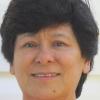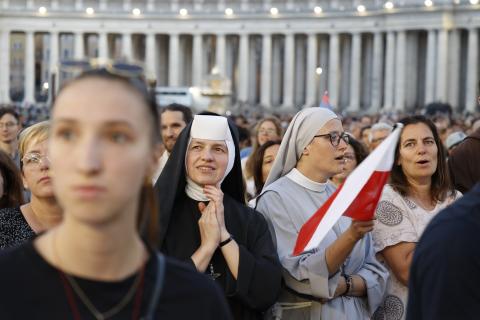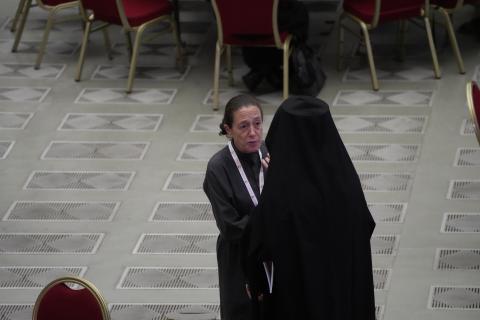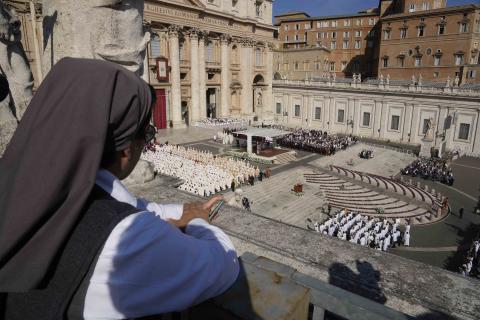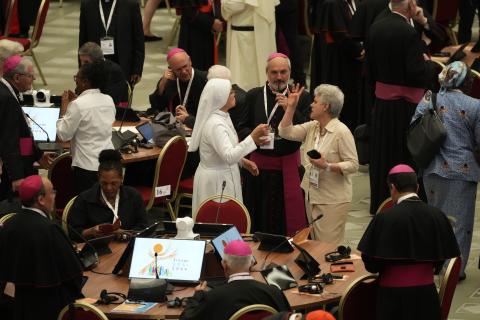Sr. Maria Elena Mendez Ochoa and sisters from the Catholic Extension delegation in Rome with Sister Raffaella Petrini. (Photo courtesy of Sr. Maria Elena Mendez Ochoa)
On April 6, I had the privilege of joining a group of 70 people for a private audience with Pope Francis in Rome. This delegation was organized jointly by Catholic Extension and St. Mary's University of Minnesota. This delegation comprised cardinals, lay people, Hispanic women religious serving in impoverished dioceses in the United States, as well as people invited by the Catholic Extension team.
On the same day as the private audience with the pope, hours later, the Vatican released the groundbreaking news. Pope Francis declared that women and laypeople would be allowed to participate with voice and vote during the Synod of Bishops in October, signifying a momentous change.
Pope Francis made a revolutionary decision to allow women and lay people elected to cast votes in that assembly. Until now, only prelates had been allowed to vote on the final document.
The news about women gaining the right to participate with a voice and vote, reminded me of the first meeting of the Diocesan Hispanic Ministry in Pennsylvania in 2010, in which until then, only priests and deacons participated.
Our community, the Guadalupanas Missionaries of the Holy Spirit, were the first women to participate, aside from the diocesan secretary who was responsible for taking notes. Initially, we assumed that, being religious, we had full participation rights. However, after a few months, I learned that the priests held a meeting to decide whether we would have a say in the group's decisions. To be honest, this surprised greatly because, as a religious, I took it for granted.
Thirteen years later, the pope's invitation to grant women and laypeople full participation in the Synod of Bishops brought me immense joy. These two groups have long been marginalized within the church.
The pope's decision to give women and the laity a voice and a vote at the synod represents a turning point for both the church and society.
The journey toward synodality must be a collective effort if we aim to move from a hierarchical structure to a more circular one. This process must involve different dimensions, including the personal, communal, ecclesial and social aspects. In this context, active participation and listening become important elements in fostering communion within the church.
During our private audience with the pope in Rome, we had the opportunity to personally greet the pope. He offered words of encouragement, urging us to continue to build up the Body of Christ, which is the church. He emphasized the importance of giving a voice to those who are often ignored, as this action reflects the inherent dignity bestowed upon each person by God. This is very important today, when the whole church embarks on the path towards synodality.
It is a widely recognized fact that for over two millennia, women have faced marginalization and have been excluded from full participation at the leadership table. Therefore, the pope's decision to grant women and laypeople a voice and a vote at the synod represents a turning point for both the church and society.
We understand that the synodal journey is not limited to papal audiences or synodal conclusions. There is still significant work ahead, particularly when it comes to accommodating new generations of Catholics who seek a place at the table of dialogue and transformation. This task is of utmost importance in our present times.
On April 7, the day after the meeting with the pope, we met with Sr. Rafaella Petrini of the Franciscan Sisters of the Eucharist. She is the highest-ranking woman in the Vatican and was appointed by Pope Francis. Despite her frail appearance, she carries the responsibility of being the Secretary General of the Governorate of Vatican City State. She carries a great responsibility on her shoulders because, in addition to representing women in the church, she is deeply convinced of the importance that, as a woman and a religious, she is bringing about change in the Vatican, in the church and in society.
There is still significant work ahead, particularly when it comes to accommodating new generations of Catholics who seek a place at the table of dialogue and transformation.
Seeing and listening to her, we sisters felt proud to know her and support her in her ministry. With this position and others that have been occupied by women, we also thanked the pope for appointing women to positions of structural transformation, because the church is not complete when women are absent from decision-making spaces.
During our meeting with Sister Raffaella, despite her limited time, we were able to hear her perspective on the impact of religious life in today's world. For her, religious life represents being channels of peace where we are called to be and to serve. She reminded us that we must not forget that above us there is a higher authority, the Holy Spirit, whom we must allow to work in us. She also emphasized the importance of being witnesses in a fragmented world and of working in synodality and networking with others in this individualistic society, as Pope Francis invites us to do.
Another question was about women's leadership in the church, to which she responded by emphasizing the importance of humility. In leadership, it is important to be humble, even when in positions of authority. We must be mindful of our frailty and that of others to keep our feet on the ground. Leadership promotes the best in people, that is a fundamental value of leadership. Another important theme of leadership is to collaborate and network to reach out to others and establish connections in the church.
Advertisement
The group was curious to know what it was like to be the secretary of state and work directly with the pope, so we asked her what she enjoyed the most in her ministry. She replied that it is a very complex job and that what she enjoys most about it is collaborating with the pope within the Vatican to bring about changes to improve the church and promote diversity.
She concluded the meeting with the group by asking for our prayers, as her job is not an easy one. Some of the responsibilities of her job include financial management of buildings and structures, communications, health care, supervision of museums, administration of residences (villas), as well as the coordination of police and fire departments. The Vatican has a staff of 2,000, but she is happy she has a good team to work with.
It is a widely recognized fact that for over two millennia, women have faced marginalization and have been excluded from full participation at the leadership table.
The women religious who were present at this meeting in Rome felt represented by her and motivated to continue to be elements of participation and synodal transformation wherever we are. This process demands changes at the personal, community, ecclesial and social levels. Above all, as Sister Rafaella said, it requires humility to recognize that we are human and that we need the guidance of the Holy Spirit to move toward communion, and beyond diversity in our daily human and spiritual journey.
The meeting with Sister Rafaella confirmed for me that men and women have the capacity to work in collaboration by putting their gifts and talents at the service of synodality to transform death into fullness of life.
Let us pray for the Synod and for all the participants, so that this ecclesial meeting may be a new Pentecost in the Spirit and lead us to become an ecclesial community.
Editor's note: This story was originally published in Spanish on Oct. 18.
